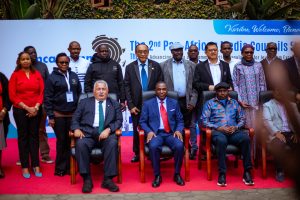A New Era for African Journalism: Highlights from the 2nd NIMCA Summit 2025 in Arusha

ARUSHA, Tanzania – The city of Arusha recently hosted a significant gathering of media leaders, regulators, and practitioners from across Africa and beyond. From July 14-17, 2025, the 2nd Network of Independent Media Councils of Africa (NIMCA) Summit, co-organized by the Media Council of Tanzania (MCT) along with the Media Council of Kenya (MCK) and the East Africa Press Council (EAPC), took place under the theme, “Advancing Media and Communication Regulations for Journalism Excellence in Africa.”
This crucial summit, which also marked the 30th anniversary of the MCT’s commitment to media self-regulation, set a new trajectory for the continent’s media landscape.
A central focus of the summit was the transformative impact of Artificial Intelligence (AI) on journalism. Delegates grappled with both the immense opportunities and the ethical complexities presented by AI. Tanzanian Vice-President, Dr. Philip Mpango, who officiated the opening of the summit, emphasized the urgent need to address the unchecked spread of disinformation and hate speech in the digital age.
In his address, Dr. Mpango stated, “It is clear that AI has brought about a radical transformation in the media sector. Despite these opportunities, AI has also introduced challenges such as the spread of misinformation and deliberate disinformation. Currently, media outlets worldwide face the challenge of distinguishing truth from distortion.”
This sentiment resonated throughout the discussions, with participants calling for robust legal and policy frameworks to ensure AI is used ethically and transparently, benefiting African societies while safeguarding journalistic integrity.
The summit served as a crucial platform to reinforce the importance of independent media regulation and self-regulation. Discussions centered on how to promote ethical accountability across national borders and strengthen the mechanisms that uphold journalistic standards.
The Media Council of Tanzania’s 30-year journey in self-regulation was celebrated, highlighting the enduring commitment to a free and responsible press in the region. Ms. Ziada Kilobo, NIMCA Board Secretary, underscored this objective, stating, “The summit aims to strengthen media regulatory frameworks to promote journalistic standards and press freedom across the continent.” This collective reflection aimed to inspire greater adherence to professional ethics and build public trust in media institutions.
A significant portion of the summit was dedicated to developing comprehensive strategies to combat misinformation, disinformation, and online harms. The need for enhanced media literacy and digital citizenship was a recurring theme. The summit also facilitated unparalleled pan-African collaboration, creating mechanisms for peer learning, joint initiatives, and cross-country solidarity. As Ernest Sungura, the outgoing Chairperson of NIMCA and Executive Secretary of MCT, articulated, the summit served as “a platform for collective reflection and strategic planning aimed at advancing press freedom and institutional responsibility across the region.”
The summit led to key leadership changes that highlight Africa’s growing influence in global media governance. Phathiswa Magopeni from the Press Council of South Africa was elected as the new Board Chairperson of the Network of Independent Media Councils of Africa (NIMCA).
At the same time, David Omwoyo, CEO of the Media Council of Kenya, took on dual leadership roles as Chairperson of the World Association of Press Councils (WAPC) and Chairperson of the East Africa Press Councils (EAPC). Lastly, Ernest Sungura, Executive Secretary of the Media Council of Tanzania, moved from NIMCA chairmanship to become Secretary General of the WAPC and Vice Chairperson of the EAPC. These appointments emphasize a commitment to strengthening media self-regulation, promoting press freedom, and encouraging greater collaboration and harmonization of media standards across African and international platforms.
A particularly notable moment was the inaugural appearance of the Media Council of Somalia (MCS) at the summit. Represented by its dedicated official, Abdiqani Abdullahi, Somalia’s participation signifies a profound commitment to fostering a free, independent, and pluralistic media landscape in line with regional and international standards. During the summit, the Media Council of Somalia was granted observer status and formally initiated its application to join both the World Association of Press Councils and NIMCA. Mr. Abdullahi confirmed, “This attendance was not merely symbolic; it represented a strategic move towards formal integration into the global media community.” This step highlights a broader commitment across the continent to embrace best practices in media regulation and accountability.
The 2nd NIMCA Summit 2025 has unequivocally charted a new course for journalism in Africa. By addressing the complexities of AI, strengthening self-regulation, combating disinformation, and fostering robust collaboration, the summit has laid a solid foundation for a more ethical, innovative, and impactful media landscape that is a catalyst for economic, social, and political development across the continent.
The Second Summit of the Network of Independent Media Councils of Africa (NIMCA) was successfully held with significant sponsorship from Taifa Gas, Ngorongoro (NCAA), Azam Media, PSSSF, WCF, NMB, Yas Mixx, TPA, and TANAPA. Meanwhile, the main partners were the Union Government of Tanzania (URT) and the Revolutionary Government of Zanzibar, UNESCO, and KONRAD ADENAUER STIFTUNG (KAS).
